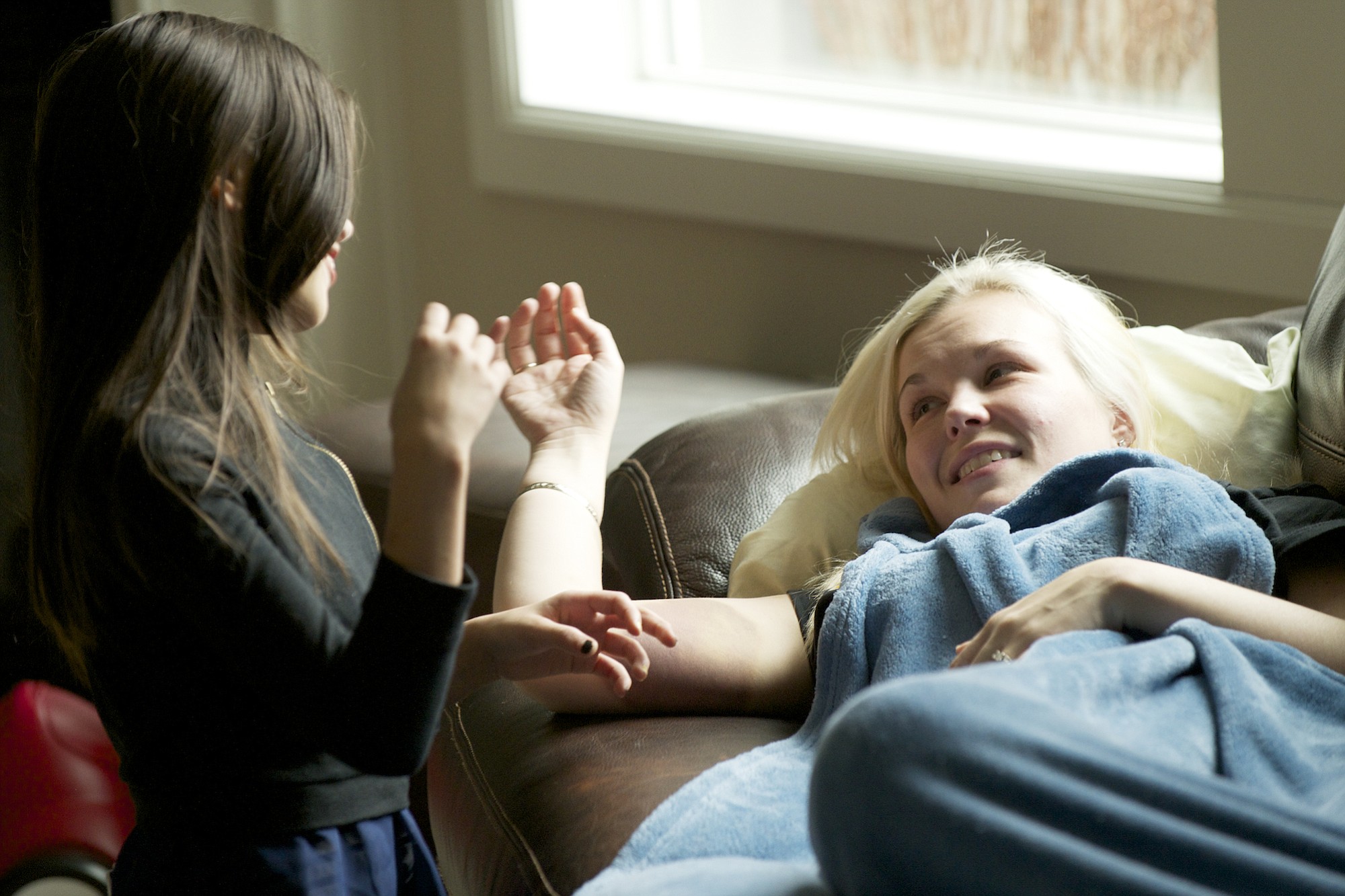Donate toward Elizabeth Mikaele’s medical expenses at www.gofundme.com/kt8as0
In stroke, every second counts. Prompt action can prevent further damage to the brain and help someone make a full recovery.
Know the signs of stroke and act FAST:
F: Facial weakness — Ask for a smile. Does the eye or the mouth droop?
A: Arm weakness — When raised, does one arm droop?
S: Speech problems — Repeat a simple sentence. Can the person speak clearly?
T: Time to call 911 if even one of these problems is new.
Source: www.legacyhealth.org/stroke
Elizabeth Mikaele thought she was dying. The 33-year-old Hudson’s Bay High School counselor was helping a student during lunchtime on Jan. 21 when she had a medical emergency.
“I felt burning down the back of my head and the front of my eyes,” Mikaele said. “In my mind, I was talking, but words weren’t coming out.”
She lost her vision, too. School staff, including her husband, rushed to her side. A school clerk asked her questions to help determine what was wrong.
Mikaele nodded and tried to talk, but she wasn’t coherent. Then she went limp in her chair and fell to the ground.
“I lost control of my body,” she said.
“It was pretty scary,” said her husband, Theo Makaele, who at that point was standing behind his wife’s chair. He is a district resource officer at Bay and the boys’ head basketball coach.
School personnel called 911. An ambulance transported her to PeaceHealth Southwest Medical Center.
Doctors determined she’d had three small strokes. One artery collapsed, and another had an aneurism. Doctors are unsure why it happened.
“I never paid attention to signs of a stroke,” Elizabeth Mikaele said. “I am young. And healthy.”
She doesn’t smoke or drink, she exercises regularly and has low blood pressure. But she’d had a persistent headache for a few days. She usually doesn’t take any medications, but she took Excedrin Migraine. That helped dull the headache, but it didn’t go away. The day before the stroke, she took ibuprofen. The next day, she took it twice.
After the strokes, she lost feeling on her left side, and she temporarily lost her ability to speak.
“That my was biggest concern — that I couldn’t talk,” she said. “I’m a counselor. That’s what I do.”
The day after her stroke, she still wasn’t coherent. Doctors told her she’d be in the intensive care unit for a week and then would be moved to another floor. But two days after the stroke, she could talk again.
“It was amazing how quickly she improved,” her husband said.
Just three days after the stroke, she had progressed so quickly with physical therapy and speech therapy that she was released to go home. It was a surprise for their children, Stacia, 11; Olivia, 8; and Jackson, 1. They hadn’t seen their mom since she’d been in the hospital. They weren’t allowed to visit her in the ICU.
Before she can return to work, Mikaele will need physical therapy and occupational therapy sessions three times a week for six to eight weeks. She will have follow-up appointments with her general practitioner and neurologist and more CAT scans. Because she is taking blood thinners, she bruises easily and must be careful. A large, purple bruise on her upper right arm is the result of a blood pressure cuff.
She can’t drive. Doing little things, like taking a shower and walking up the stairs, leaves her exhausted. She has to have help doing everything and can’t be by herself. Eight weeks is a long time for friends and family members to fill in, Mikaele said.
In stroke, every second counts. Prompt action can prevent further damage to the brain and help someone make a full recovery.
Know the signs of stroke and act FAST:
F: Facial weakness -- Ask for a smile. Does the eye or the mouth droop?
A: Arm weakness -- When raised, does one arm droop?
S: Speech problems -- Repeat a simple sentence. Can the person speak clearly?
T: Time to call 911 if even one of these problems is new.
Source: www.legacyhealth.org/stroke
Her husband has taken leave to stay with her, but likely will return to work next week. They will have to hire help to stay with her. Although they have good medical insurance, it won’t be enough.
A former Hudson’s Bay student set up a GoFundMe account to help with medical expenses.
Mikaele has been spending her days lying on the couch surrounded by her family. From her place on the couch, she can see the many flowers, cards and big banners sent by Hudson’s Bay students and staff wishing her well. The outpouring of support from the Hudson’s Bay community has been immense, she said.
When she was still in the hospital, the boys basketball team finished their game and then gathered in the hospital lobby to check on their coach’s family. Now that she is home, friends have been delivering groceries and prepared meals.
“We really appreciate all the help,” Elizabeth Mikaele said. “It’s easier to be on the other side of giving help than needing the help.”
She said some of the most helpful people have been students and former students.
“Some students who others might have dismissed have been the most helpful and compassionate at this time,” she said. “It gives me hope.”
Friends, students and staff are eager to visit.
“Theo has to set limits on visitors,” Mikaele said. “Everyone means well, but I’m still so tired.”
In addition to Theo Mikaele coaching basketball, their daughters also play basketball.
“We kind of eat, live, sleep and breathe basketball around here,” Elizabeth Mikaele said. “So being on the couch isn’t working very well.”
Her principal, Valerie Seeley, was one of the first to be on the scene during Mikaele’s medical emergency.
“For all of us at Bay, Elizabeth’s stroke was a huge devastation and surprise that it could happen to someone so young,” said Seeley.
Seeley said other staff members can donate their leave to Mikaele, who used up her leave after her son, Jackson, was born. Next, Seeley is looking for a substitute to fill in for Mikaele while she recovers.
“They are hard shoes to fill, but I’m hoping we can get a candidate until Elizabeth can return to Bay,” Seeley said.




